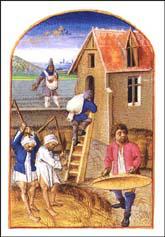William of Malmesbury
William of Malmesbury was born in Wiltshire in about 1095. His father was a Norman and his mother came from England. William became a Benedictine monk at Malmesbury Abbey, and while working in its library he became interested in history.
Malmesbury's books include Deeds of the Kings of England (449 to 1127) and Recent History (1128 to 1142). In his work he praised Harold but justified the Norman invasion because of what he called the "sins of the flesh" of the English.
Malmesbury was a conscientious historian. He searched for new primary sources including those produced in other countries and was able to read documents in several different languages. Malmesbury also used topography and buildings as evidence and was very interested in human character and motivation.
William's willingness to look critically at primary sources and his interest in cause and effect, helped him become one of the most important historians of the medieval period. William of Malmesbury died in 1143.

(S1) William of Malmesbury, Chronicle of the Kings of the English (c1128)
William Rufus had a red face, yellow hair, different coloured eyes... astonishing strength, though not very tall and his belly rather projecting... he had a stutter, especially when angry.
The day before the king died he dreamt that he went to heaven. He suddenly awoke. He commanded a light to be brought, and forbade his attendants to leave him.
The next day he went into the forest... He was attended by a few persons... Walter Tirel remained with him, while the others, were on the chase.
The sun was now declining, when the king, drawing his bow and letting fly an arrow, slightly wounded a stag which passed before him... The stag was still running... The king, followed it a long time with his eyes, holding up his hand to keep off the power of the sun's rays. At this instant Walter decided to kill another stag. Oh, gracious God! the arrow pierced the king's breast.
On receiving the wound the king uttered not a word; but breaking off the shaft of the arrow where it projected from his body... This accelerated his death. Walter immediately ran up, but as he found him senseless, he leapt upon his horse, and escaped with the utmost speed. Indeed there were none to pursue him: some helped his flight; others felt sorry for him.
The king's body was placed on a cart and conveyed to the cathedral at Winchester... blood dripped from the body all the way. Here he was buried within the tower. The next year, the tower fell down.
William Rufus died in 1100... aged forty years. He was a man much pitied by the clergy... he had a soul which they could not save... He was loved by his soldiers but hated by the people because he caused them to be plundered.
Primary Sources
(1) William of Malmesbury, The Deeds of the Kings of the English (c. 1140)
To be a member of the Cistercian order... is now believed to be the surest way to heaven... Certainly many of their regulations seem severe... they wear nothing made with furs or linen... They have two tunics with hoods, but no additional garments... they do not take more than one meal a day, except on Sunday. They never leave the cloister but for the purpose of labour, nor do they ever speak, either there or elsewhere, save only to the abbot or prior... While they look after the stranger and the sick, they inflict intolerable tortures on their own bodies, for the health of their souls.
